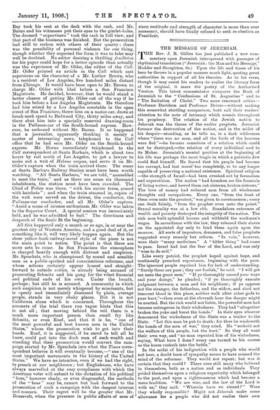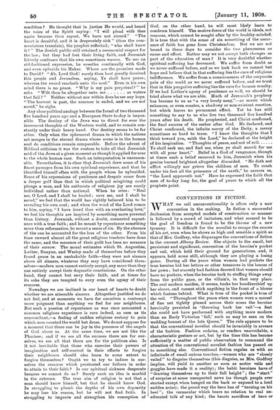THE MESSAGE OF JEREMIAH. T HE Rev. J. R. Gillies has
just published a new com- mentary upon Jeremiah interspersed with passages of rhythmical translation (" Jeremiah : the Man and his Message," Hodder and Stoughton, 6s.) Upon the life and times of his hero he throws in a popular manner much light, quoting great authorities in support of all his theories. As to his verse, though it may assist his readers to realise the literary form of the original, it mars the poetry of the Authorised Version. This latest commentator compares the Book of Jeremiah to the "Confessions of St. Augustine" and to "The Imitation of Christ." Two more renowned critics— Professor Davidson and Professor Driver—without making. this somewhat startling comparison, both call their readers' attention to the note of intimacy which sounds throughout his prophecy. The relation of the Jewish nation to Jehovah was the theme of the earlier prophets. Jeremiah foresaw the destruction of the nation, and in the midst of his despair—standing, as he tells us, in a dark wilderness where "there was no man, and all the birds of the heavens were fled "—he became conscious of a relation which could not be destroyed,—the relation of every individual soul to its Maker. Jeremiah's mental position at the beginning of his life was perhaps the most tragic in which a patriotic Jew could find himself. He feared that his, people had become too corrupt, had lost moral 'too completely, to be any longer capable of preserving a national existence. Spiritual religion —the strength of Israel—had been crushed out by formalism and superstition. The nation "had forsaken me the fountain of living waters, and hewed them out cisterns, broken cisterns." The love of money had seduced men from all wholesome thoughts- and occupations. Every one, "from the least of them even unto the greatest," was given to covetousness ; every one dealt falsely, "from the prophet even unto the priest." Sexual morality was at a low ebb. Scandalous extremes of wealth and poverty destroyed the integrity of the nation. The rich men built splendid houses and withheld the workmen's wages. In accordance with the law, they released their slaves on the appointed day only to bind them again upon the morrow. All sorts of impostors, dreamers, and false prophets suggested every remedy but reform. "In vain," however, were their "many medicines." A "bitter thing" had come to pass. Israel had lost the fear of the Lord, and was only "wise to do evil."
Like every patriot, the prophet hoped against hope, and continually preached repentance, beginning with the poor. The ignorant people repulsed him for lack of understanding. "Surely these are poor ; they are foolish," he said. "I will get me unto the great men." "If ye thoroughly amend your ways and your doings," he pleaded ; "if ye thoroughly execute judgment between a man and his neighbour ; if ye oppress not the stranger, the fatherless, and the widow, and shed not innocent blood in this place, neither walk after other gods to your hurt,"—then even at the eleventh hour the danger might be averted. But the rich would not listen, the powerful men had become outrageous in their wickedness. They had "altogether broken the yoke and burst the bonds." In their eyes whoever denounced the wickedness of the State was a traitor to the State. "Let this man be put to death: for thus he weakeneth the bands of the men of war," they cried. He " seeketh not the welfare of this people, but the hurt." So they all went their own way, and "no man repented him of his wickedness, saying, What have I done ? every one turned to his course as the horse rusheth into the battle."
In the midst of his indignation with a people who would not hear, a doubt born of sympathy seems to have crossed the mind of the reformer. They would not repent; but was it certain that they could ? There were still many who believed in themselves, both as a nation and as individuals. They prided themselves upon a religious superiority which belonged to the past, and upon a righteousness which had become a mere tradition. "We are wise, and the law of the Lord is with us," they said. "Wherein have we sinned ?" Were they wholly responsible ? Might not Jehovah make some allowance for a people who did not realise their own condition ? He thought that in justice He would, and heard the voice of the Spirit saying : "I will plead with thee again because thou sayest, We have not sinned." "The heart is deceitful, and it is desperately sick'! (thus the com- mentators translate), the prophet reflected; "who shall know it ? " The Jewish public still retained a ceremonial respect for the law ; but they had lost their living faith, and Jeremiah bitterly confesses that his own sometimes wavers. To use an old-fashioned expression, he wrestles continually with God, and even upbraids his Maker. Where are the promises made to David ? " Ah, Lord God! surely thou bast greatly deceived this people and Jerusalem, saying, Ye shall have peace; whereas the sword reacheth unto the soul." Even in his own mind there is no peace. "Why is my pain perpetual ? " he asks. "Wilt thou be altogether unto me as waters that fail ? " Neither without nor within does he see any hope. "The harvest is past, the summer is ended, and we are not .saved," he sighs, Any close political analogy between the Israel of two thousand five hundred years ago and a European State to-day is impos- sible. The destiny of the Jews was to direct for ever the innermost thoughts of the Western world, and to remain con- stantly under their heavy hand. Our destiny seems to be far other. Only when the ephemeral drama in which the nations act merges in the eternal drama whose scene is in the human soul do conditions remain comparable. Before the advent of Biblical criticism it was the custom to take all that Jeremiah said of the Jews at a given moment as though it applied for ever to the whole human race. Such an interpretation is unreason- able. Nevertheless, it is clear that Jeremiah drew some of his finest passages from his own spiritual experience, and that he identified himself often with the people whom he upbraided. Some of his expressions of penitence and despair come from a deeper gulf than that in which political misgiving could plunge a man, and his outbursts of religious joy are surely individual rather than national. When he cries : "Heal me, 0 Lord, and I shall be healed ; save me, and I shall be saved," we feel that the world has rightly believed him to be revealing his own soul ; and when the word of the Lord comes to him, saying, "I have loved thee with an everlasting love," we feel his thoughts are inspired by something more personal than history. Jeremiah, without a doubt, connected repent- ance with a true faith ; and be meant by repentance something more than reformation, he meant a sense of sin. By the absence of the one he accounted for the loss of the other. From his time onward almost all the great religious teachers have done the same, and the measure of their guilt has been no measure of their sorrow. The moral estimates which St. Augustine, Luther, Bunyan, and Wesley made of themselves before they found peace in an unshakable faith—they were not sinners above all sinners, whatever they may have considered them- selves—modern men cannot entirely accept, any more than they can entirely accept their dogmatic conclusions. On the other band, they cannot but envy their faith, and at times for its sake they are tempted to envy even the agony of their remorse.
Nowadays we are inclined in our heart of hearts to doubt whether we are miserable sinners. Altogether justified we do not feel, and at moments we have for ourselves a contempt more poignant than anything we feel for our neighbours. But such a passion of repentance as was once accounted a common religious experience is rare indeed, as rare as its concomitant,—a feeling of sudden religious ecstasy to gain which men counted the world but dross. We do not suppose for a moment that there can be joy in the presence of the angels of God about us. At the same time, we are not like the Pharisee; and if we see all the excuses there are for our- selves, we see all that there are for the publican also. Is it not inevitable that those who exercise their powers of imagination and self-control in their efforts to forgive their neighbours should also learn to some extent to forgive themselves ? Ought we to try to induce in our- selves the remorse which prostrated our fathers in order to attain to their faith ? Is our spiritual sickness desperate because we cannot do so Surely such an idea is morbid in the extreme. The true aim of religion • is not that a man should know himself, but that he should know God. In struggling to plumb the depths of his own depravity he may lose his reason, but he will not find faith. In struggling to improve and strengthen his conception of God, on the other hand, he will most likely learn to condemn himself. The motive-force of the world is ideals, not remorse, which cannot be sought after by the healthy-minded. It is true that with the sense of sin something of the assur- ance of faith has gone from Christendom. But we are not bound in these days to consider the two phenomena as cause and effect. Rather may we not accept both changes as part of the education of man ? It is very doubtful whether spiritual suffering has decreased. We suffer from doubt as we never suffered before, and as we look back we cannot but hope and believe that in that suffering lies the cure of religious indifference. We suffer from a consciousness of the corporate pain of the world as we never suffered before, and we trust that in this purgative suffering lies the cure for human cruelty. If we had Luther's agony of penitence as well, we should be tried above what we are able. Much of Jeremiah's prophecy has become to us as "a very lovely song,"—as music which enhances, or even creates, a shadowy or non-existent emotion, but which leaves no permanent effect. Yet he has still something to say to us who live two thousand five hundred years after his death. He prophesied, and Christ confirmed, the final success of the seeker after God. He declared, and Christ confirmed, the infinite mercy of the Deity, a mercy sometimes so hard to trace. "I know the thoughts that I think toward you, saith the Lord," he declared at the height of his inspiration. "Thoughts of peace, and not of evil Ye shall seek me, and find me, when ye shall search for me with all your heart." Belief in a God of vengeance, though at times such a belief recurred to him, Jeremiah when his genius burned brightest altogether discarded. "He doth not afflict willingly nor grieve the children of men. To crush under his feet all the prisoners of the earth," he assures ue, "the Lord approveth not." Here he expressed the faith that men of to-day long for, the goal of peace to which all the prophets point.











































 Previous page
Previous page